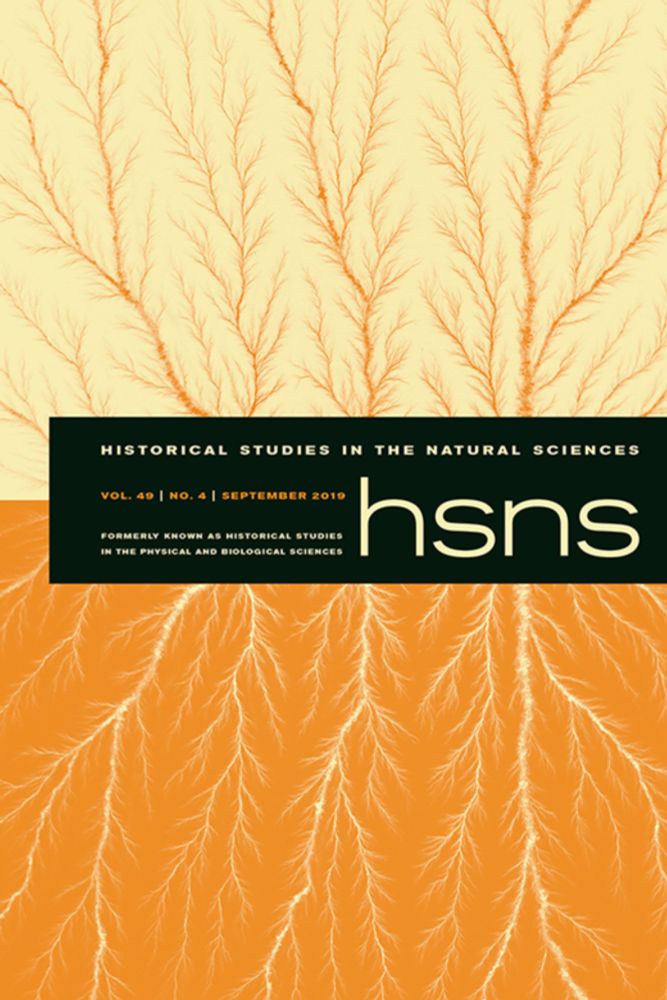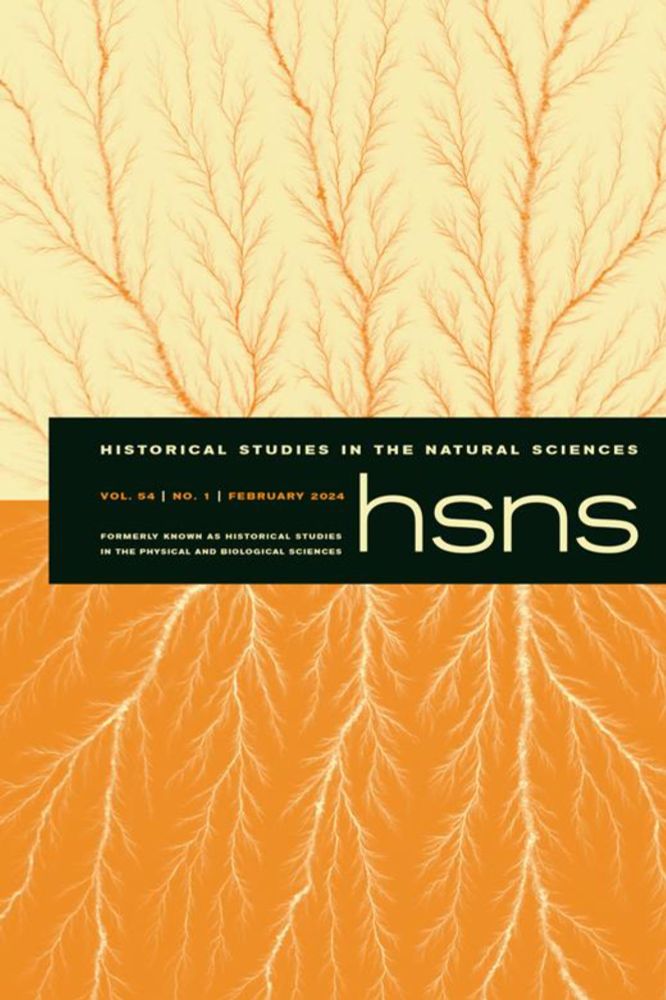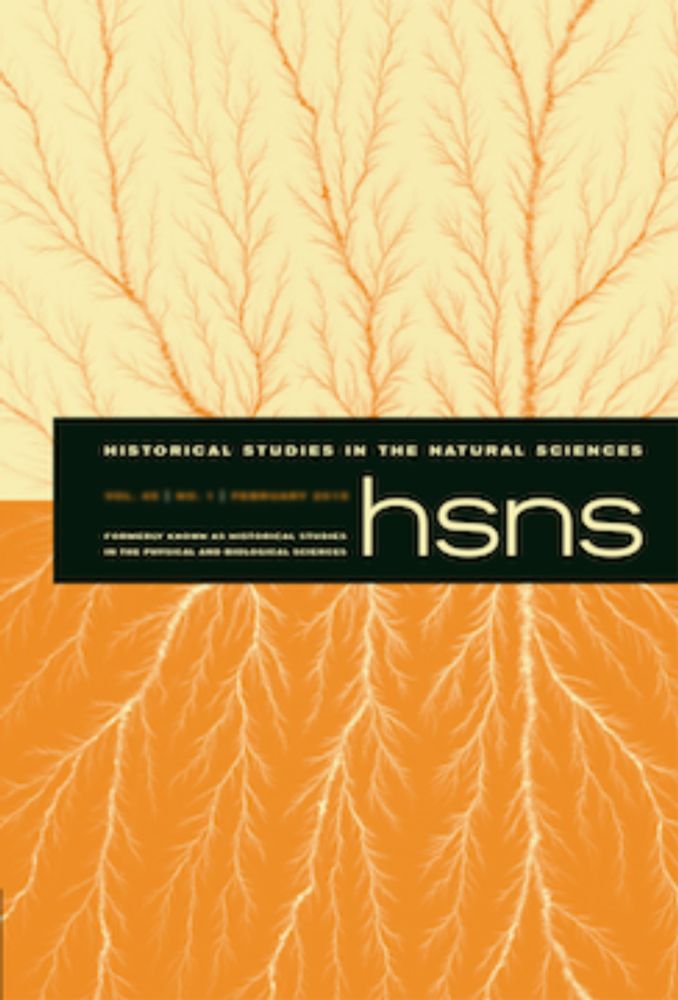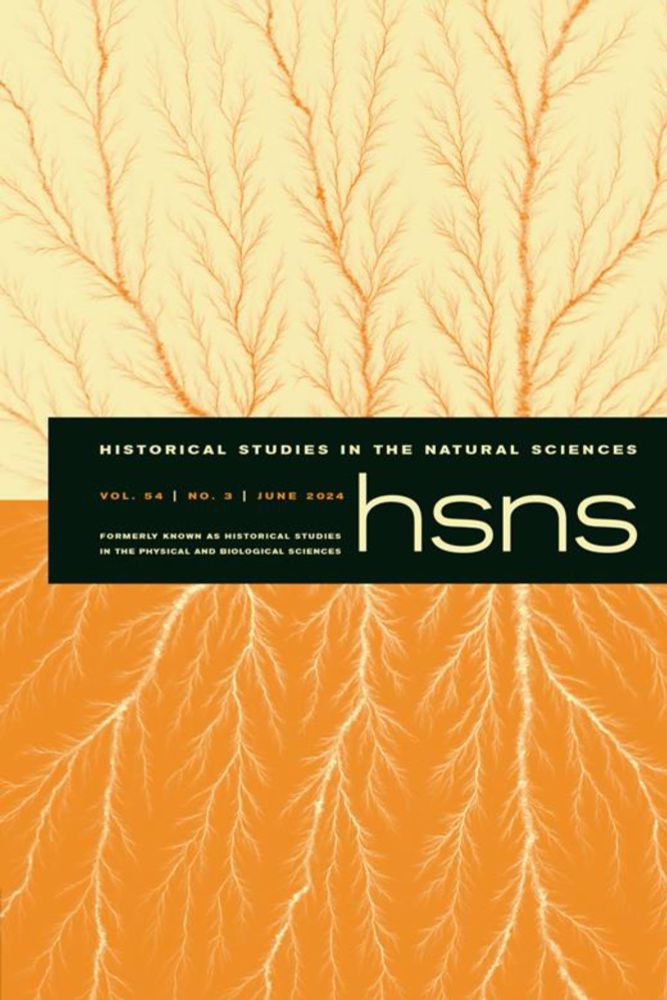The Vaccine
Recent history resonates with current public health conversations. Check out 2021's Essay section on Pandemic Subjects. Dora Vargha's short article "The Vaccine" says it all: "Vaccines are technologies of trust...and trust can fray at any point." online.ucpress.edu/hsns/article...
02.04.2025 17:33 — 👍 0 🔁 1 💬 0 📌 0
Weart's work shows how funding in the cold war increased government support for science deemed important for security and international collaboration, but the Regan era politicized wide swaths of research- especially climate science- drying up support and reducing funds. History.Exhausting.Amirite?
17.03.2025 13:23 — 👍 0 🔁 0 💬 0 📌 0
Weart's article details the link between funding and politicization of climate change, tracking his funding sources from its small start during the International Geophysical Year to funding by NOAA, the Department of Energy, NSF, and the USGS between 1977 and 1980. But that bubble also burst.
17.03.2025 13:23 — 👍 1 🔁 0 💬 1 📌 0
Money for Keeling: Monitoring CO2 levels
C.D. Keeling's measurements of the level of carbon dioxide (CO2) in the atmosphere since 1957, tracking a rise that threatens global warming, form one of the most important scienti.c data sets ever cr...
Today is a great day to read Spencer Weart's paper on funding at Mauna Loa Observatory: doi.org/10.1525/hsps... From the #vault, it begins "Funding is obviously a necessity for scientific research, but the details of the funding of a given program have rarely been studied in detail."
17.03.2025 13:23 — 👍 11 🔁 11 💬 1 📌 0
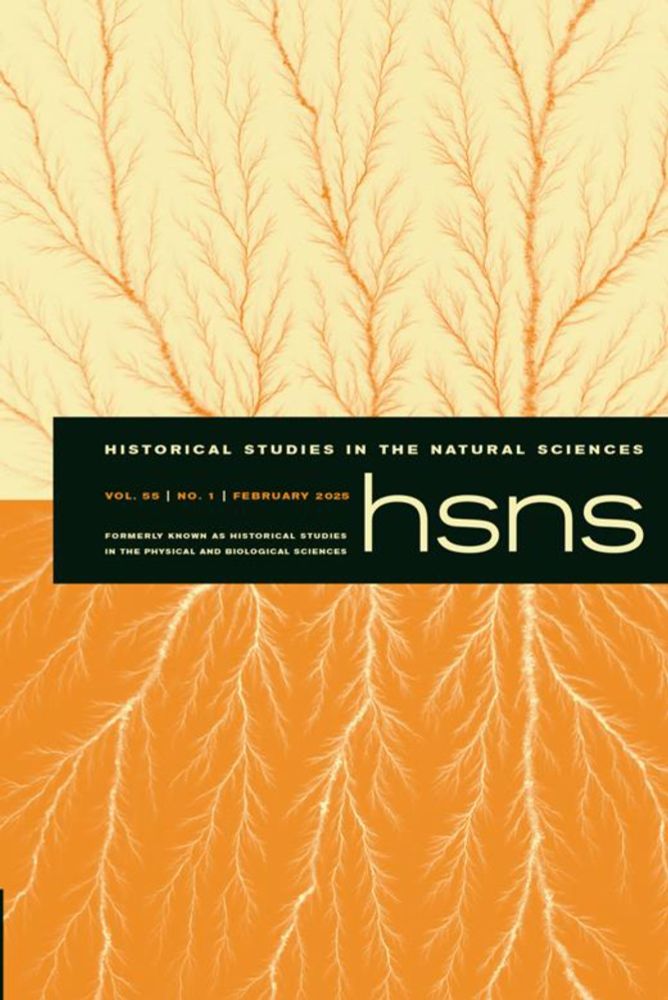
Volume 55 Issue 1 | Historical Studies in the Natural Sciences | University of California Press
Find all these articles here, plus Shin and DeVorkin's article on the half century long battle to develop a national planetarium for the US. Taken together, this Volume speaks heavily to the politics of science in the 20th century. online.ucpress.edu/hsns/issue/5...
10.03.2025 15:21 — 👍 0 🔁 0 💬 0 📌 0
Using these papers, the authors show how Wilson positioned his science in the political climate of the Cold War, casting his critics as enemies of both science and the State. Other essays examine the impact of Sociobiology on ecological thought and its legacy today.
10.03.2025 15:21 — 👍 0 🔁 0 💬 1 📌 0
Each essay examines the debates and legacy of E.O. Wilson's publication. This collection of essays is particularly rich, as many of the scholars used Wilson's recently opened papers at the Library of Congress.
10.03.2025 15:21 — 👍 0 🔁 0 💬 1 📌 0
It's very easy to think that scientists are politically united. But the newest issue of HSNS is a close look at the politics of science. Vol 55 Issue 1 contains 11 short essays looking at the legacy of E.O. Wilson's Sociobiology at 50.
10.03.2025 15:21 — 👍 4 🔁 2 💬 1 📌 0
Thought you'd find this useful @nzjh.bsky.social @conteurohistory.bsky.social @euroreviewhistory.bsky.social @isisjournal.bsky.social @asia-pacific-echr.bsky.social @enghistrev.bsky.social @hsnatsci.bsky.social @jmormonhist.bsky.social @jofvictculture.bsky.social @jbritishstudies.bsky.social
28.01.2025 22:22 — 👍 2 🔁 1 💬 0 📌 0
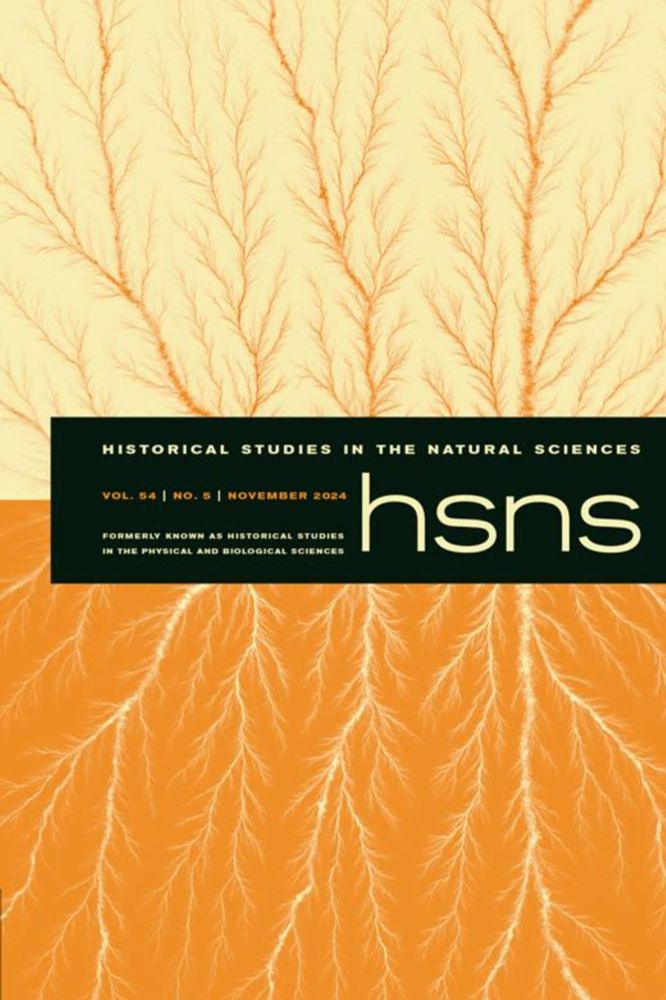
Volume 54 Issue 5 | Historical Studies in the Natural Sciences | University of California Press
All of these essays are worth the read. I do believe that reading them together will help you think clearly about AI in the academy and your role in shaping that role. online.ucpress.edu/hsns/issue/5...
14.01.2025 21:08 — 👍 1 🔁 0 💬 0 📌 0
And Jennifer Robertson suggests new forms of fieldwork that will help scholars better understand and process the rapid changes in robotics and automated life in the 21st century. Joseph Martin, the editor of the journal, finishes with an essay that reflects on the role of editors in this new world.
14.01.2025 21:08 — 👍 0 🔁 0 💬 1 📌 0
Damien P. Williams suggests that issues with AI "scholarship" intertwines with academic publish or perish culture- pushing scholars to accept the slight of hand that interprets publishing with knowledge production. Instead, he suggests we interrogate what knowledge means outside of this system.
14.01.2025 21:08 — 👍 0 🔁 0 💬 1 📌 0
" In the face of such a profound threat from AI, researchers should take a leaf out of the Luddites’ playbook by intervening and organizing wherever possible to prevent automation imposed by commercial publishers and analytics companies."
14.01.2025 21:08 — 👍 1 🔁 0 💬 1 📌 0
Check out Alex Csiszar, Nicole Howard, and Samuel A. Moore's essays. They historicize scientific publication, quick production of written materials, and the development of automation. Moore uses Hobsbawm's historical account of Luddites to call for an intervention.
14.01.2025 21:08 — 👍 1 🔁 0 💬 1 📌 0
Melinda Baldwin and Brigid Vance have put together 6 short essays examining AI in academic publishing through a historical lens. And it is calming me down!
14.01.2025 21:08 — 👍 0 🔁 0 💬 1 📌 0

Volume 54 Issue 5 | Historical Studies in the Natural Sciences | University of California Press
At the beginning of the semester, if questions of AI in academia are stressing you out, could I suggest reading through our most recent set of essays? online.ucpress.edu/hsns/issue/5...
14.01.2025 21:08 — 👍 6 🔁 3 💬 1 📌 0
Hoffman says that "it can be said that controversies are often treated as similar to natural experiments, which, with no planned intervention, reveal elementary attributes of scientific knowledge production."
05.12.2024 20:00 — 👍 1 🔁 0 💬 1 📌 0
Christoph Hoffmann's article in the most recent Issue of HSNS looks at an "instructive controversy"- the debate between Carl von Hess and Karl von Frisch regarding color vision in fish and bees.
05.12.2024 20:00 — 👍 2 🔁 0 💬 1 📌 0
Good day to all our new followers! Here are two papers from our #archives on the intersections of science and national identity. A good way to think about how science has aided the politicization of race and culture over time.
14.11.2024 19:27 — 👍 2 🔁 0 💬 1 📌 0
This collaborative essay is an amazing example of how scholars are building intellectual communities in the history of science.
@ejonesimhotep
Awa Hanane Diagne Emily Grenon Syeda Hasan Holly K.M. Johnstone
@AlexanderOfford
Neve Ostry Young Sarai Rudder
09.07.2024 16:29 — 👍 0 🔁 0 💬 1 📌 0
The essay unpacks these layers of hiddenness- what does it mean for artifacts to be built to hide something and then be hidden away ? How can historians access these forms of underground knowing to get at a deeper understanding of Black technological ingenuity?
09.07.2024 16:29 — 👍 0 🔁 0 💬 1 📌 0
The section also shows how these hidden objects were themselves hiding Black technological ingenuity. Black inventors, engineers, and scientists , often underground themselves, but were a "space of imagination and a site of Black world-making."
09.07.2024 16:29 — 👍 0 🔁 0 💬 1 📌 0
"The androids performed a range of functions—entertainment, ridicule, voyeurism, mysticism, obfuscated desire. But they were also part of an effort to create, maintain, and spread what Evelyn Hammonds has called the myth of “Black technological disingenuity---..."
09.07.2024 16:29 — 👍 0 🔁 0 💬 1 📌 0
The essay uses chrestomathy to work through all the ways that these androids functioned and still function today. The section entitled "underground" shows how these objects often remain hidden in museums because of their racist overtones.
09.07.2024 16:28 — 👍 2 🔁 0 💬 1 📌 0
Today is a great day to read "The Black Androids: A Chrestomathy" in the latest issue of HSNS. A Chrestomathy is a group of readings compiled to help a student learn a language. The authors of this essay use this framework to work through their study of black androids.
09.07.2024 16:27 — 👍 3 🔁 3 💬 1 📌 0
International Commission of the History of Oceanography
Publishing voices that drive change & impact how people think. Founded in 1893. linkin.bio/ucpress
Comet hunting in plate vaults & libraries, Meyer comet group, orbit linking & calculating, cometary history, MP (52005), author, currently working on revision of Cometography 1, visual comet observing, www.comethunter.de
ORCID: 0009-0004-8545-9458
I am Gregory (Greg) Good, historian of science, with an eye on technology, environment, and bigger worldviews. I write about human understanding of Earth and our near-space environment since about 1800. #histsci #histech #envhist #histgeo
Historian of Biology and Medicine. Science is culture, and long live the humanities. Director of @manchstm.bsky.social. Lapsed biochemist. Immigrant. Centrist dad. Rheinländer. Cyclist. Gen X. Owned by dog. Unhealthily online. Posts private. He/him. 🇬🇧 🇩🇪
We are the Centre for the History of Science, Technology & Medicine (CHSTM) at the University of Manchester. Follow us for updates about seminars, events, research, teaching. Currently posting: @ctimmermann.bsky.social
https://www.chstm.manchester.ac.uk
Architect, historian, writer, mother, traveller between worlds. Currently reading, writing, researching and mentoring @khiflorenz.bsky.social and @kit.edu.
Leverhulme Research Fellow HPS Leeds | Inaugural USC Carrollian Fellow | Tutor Oxford ContEd | Formerly York SATSU & DPhil Oxford EnFac | Editor Lewis Carroll Review | Polymath | Erdős–Bacon No 8 | #scicomm #envhist #histmed
Ill-tempered Auntie now haunting Rhode Island. Wrote books etc. on history of science/medicine, mostly medieval. Always in trouble for something. Old. Hangs with prof who writes lots on global capitalism and science. Multinational. Uncollegial.
"Transgressively ludic." —𝘗𝘳𝘰𝘤𝘦𝘦𝘥𝘪𝘯𝘨𝘴 𝘰𝘧 𝘵𝘩𝘦 𝘔𝘰𝘥𝘦𝘳𝘯 𝘓𝘢𝘯𝘨𝘶𝘢𝘨𝘦 𝘈𝘴𝘴𝘰𝘤𝘪𝘢𝘵𝘪𝘰𝘯
proud member of a union
ESEH's Next Generation Action Team (NEXTGATe). Representing the Early Career Researchers branch of the European Society for Environmental History. We do events, workshops, etc. aimed at helping scholars navigate murky academic life
Philosophy, Theory, and Practice in Biology is a peer-reviewed, free-to-authors, open-access academic journal, edited by philosophy and biology professors and published by Michigan Publishing at Univ. of Michigan Library. We're online at https://ptpbio.org
Military-Environmental History, #envhist Department of Engineering and Society, UVA, Greenhouse Center for Environmental Humanities U. Stavanger, History of Airborne Disease, Technology, Chemistry, Biology, Senses, CW & BW… and ships and railroads.
Professor Emerit at UC Davis. Researches in the history & philosophy of biology and environmental ethics. https://www.RLM.net/
New open-access book w/ U Chicago Press: _The Land Is Our Community: Aldo Leopold's Environmental Ethic for the New Millennium_
Medical historian at the University of Augsburg | Writes about psychiatry, psychotherapy, hospital architecture, past futures of medicine #histmed #histsci #histtech #histSTM
Private account
Freelance these many years after quitting academia early (history and philosophy of science and technology,From Mineralogy to Geology); then food history (Cuisine and Empire: Cooking in World History). www.rachellaudan.com
The British Society for the History of Science is Britain's largest learned society devoted to #HistSTM #HSTM #HistSci. Handled by Comms Officer: Alexander Stoeger
visual anthropologist. urban geographer. more-than-human entanglements, ecologies, and ethnographies.
mathildarosengren.net
https://urban-nature-temporalities.com/
Cultural and environmental historian of Canada and the Arctic. Author of *A Cold Colonialism: Modern Exploration and the Canadian North* (2025). Co-editor of *Made Modern: Science and Technology in Canadian History* (2018). She/her.


